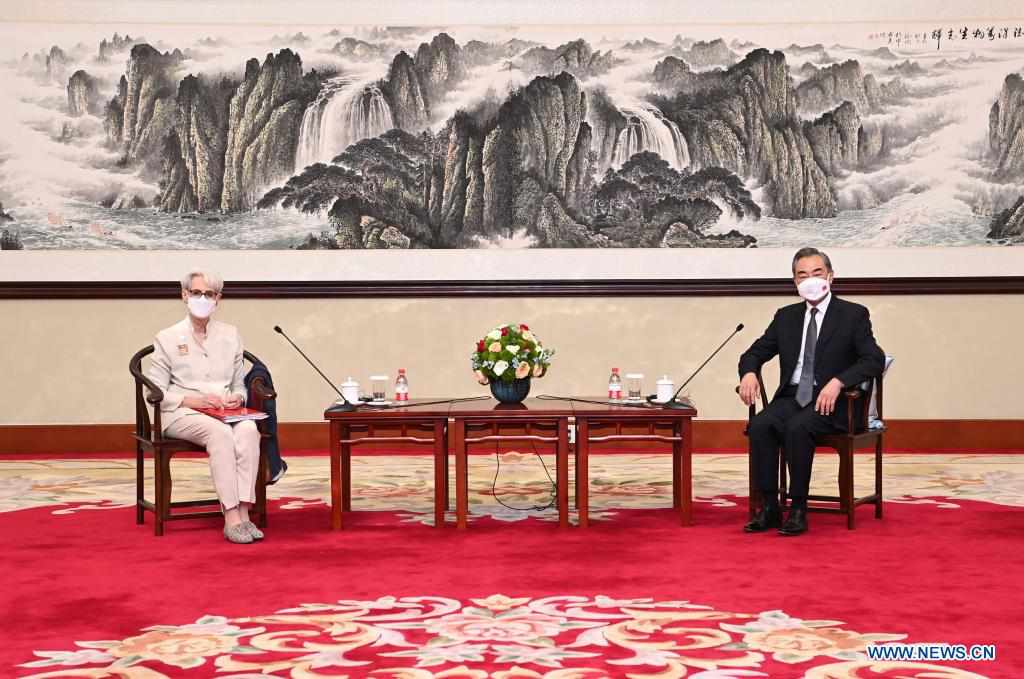Chinese FM meets U.S. deputy secretary of state, urging rational China policy

Chinese State Councilor and Foreign Minister Wang Yi (R) meets with U.S. Deputy Secretary of State Wendy Sherman in north China's Tianjin on July 26, 2021. (Xinhua/Li Ran)
TIANJIN, July 26 (Xinhua) -- Chinese State Councilor and Foreign Minister Wang Yi on Monday met with U.S. Deputy Secretary of State Wendy Sherman, urging the United States to drop arrogance and prejudice and steer back to a rational and pragmatic China policy.
In face of severe difficulties and challenges in China-U.S. relations, Wang said it requires serious consideration for the U.S. side to make correct choices as to whether the bilateral ties will head to confrontation or improvement.
Calling Sherman's visit a part of mutual contact and dialogue, Wang said the two sides should enhance mutual understanding, erase misunderstanding, avoid misjudgment and better manage differences via constant dialogues.
As the new U.S. administration has in general continued its predecessor's extreme and erroneous China policy, constantly challenged China's bottom line, and stepped up containment and suppression on China, Wang said China is firmly opposed to such U.S. practices.
Noting the U.S. attempt to impede and disrupt China's modernization drive, Wang said "such an attempt is doomed to fail for now, and is even more so in the future."
China's development, driven powerfully from within, is a trend of historical evolution, Wang said, adding that socialism with Chinese characteristics totally fits China's national realities.
"The great rejuvenation of Chinese nation has entered an irreversible historical process, which cannot be held back by any force or country."
He said China sticks to the path of peaceful development and follows an open strategy of win-win cooperation. China will never tread the beaten track of big powers in seeking hegemony, and is willing to realize common development and prosperity with all countries including the United States, Wang added.
Wang also said that China's development is aimed at seeking happiness for all Chinese people, rather than challenging or replacing the United States. "We take no interest in betting winnings or losses of the U.S. side. China's development is not based on the premise of U.S. decline."
To prevent China-U.S. relations from further deteriorating or even getting out of control, Wang underlined three basic demands as bottom lines that China firmly upholds.
He said the first is that the United States must not challenge, slander or even attempt to subvert the path and system of socialism with Chinese characteristics.
Chosen by history and the Chinese people, China's path and system are matters of Chinese people's welfare and Chinese nation's future, as well as core interests that China must firmly uphold, Wang said.
The second, Wang said, is that the United States must not attempt to obstruct or interrupt China's development process.
Chinese people have their rights to live better lives and China has its right to achieve modernization, said Wang, adding that modernization is not an exclusive right of the United States.
China urges the United States to remove all unilateral sanctions, high tariffs, long-arm jurisdiction and technology blockade it has imposed on China as soon as possible, Wang said.
Wang said the third is that the United States must not infringe upon China's state sovereignty, or even damage China's territorial integrity.
He said issues regarding Xinjiang, Tibet and Hong Kong have never been about "human rights" or "democracy," but about fighting against "Xinjiang independence," "Tibet independence" and "Hong Kong independence."
No country will allow its national sovereignty and security to be compromised, Wang added.
As for the Taiwan question, Wang said it's even more important. He said the fact that both sides of the Taiwan Strait belong to one and the same China and Taiwan is part of China has never changed and will never change.
If "Taiwan independence" forces dare to provoke, China has the right to take any necessary measure to stop it, Wang said, urging the U.S. side to honor its commitment on Taiwan question and act prudently.
China is the largest developing country and the United States is the largest developed country, and neither side can replace or defeat the other, Wang said. "We have a clear view on where China-U.S. relations are headed, that is, to find a way for two major countries with different systems, cultures and stages of development to coexist peacefully on this planet through dialogue."
It would be even better if it could be mutually beneficial, Wang said, adding that this is a good thing for both China and the United States, and a great boon for the world. "Otherwise, it would be a catastrophe."
"It is hoped that the U.S. side will have an objective and correct understanding of China, abandon arrogance and prejudice, stop acting as a preacher, and return to a rational and pragmatic China policy," Wang said.
Noting the U.S.-China relationship is the most important bilateral relationship in the world, Sherman said the United States is willing to continue to have open and candid contacts and dialogues with China.
The United States also hopes that the two countries can coexist peacefully. It has no intention of restricting China's development, nor does it want to contain China, but would like to see China's development, Sherman said.
The two sides can engage in healthy competition, cooperate on climate change, drug control and international and regional hotspot issues, strengthen crisis management capacity, and avoid conflicts, Sherman said.
Sherman said as two major countries, the United States and China can communicate and discuss in a responsible way even if they have differences, in the hope that both sides will take joint actions to improve bilateral relations.
Sherman reiterated that the United States adheres to the one-China policy and does not support "Taiwan independence."
The two sides also exchanged views on international and regional issues of common concern.
Photos
Related Stories
- China puts forward two lists during talks with visiting U.S. deputy secretary of state
- China urges U.S. to change misguided mindset
- China urges U.S. to address its own human rights issues first: Chinese Vice FM
- US urged to show goodwill in China talks
- Political virus also needs origin-tracing: Chinese FM
Copyright © 2021 People's Daily Online. All Rights Reserved.










